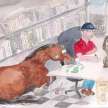Britain Shall Not Go Hungry After Brexit
Or could it?

“I disapprove of what you say but I will defend... etc, etc, etc”
I wouldn’t, as Voltaire is believed to have said, “defend to the death” the positions taken in this letter, even though I would still defend the right of someone to express their opinion. This letter smacks of an era in Britain’s history when the population was encouraged, albeit under significantly different circumstances, to roll up their sleeves, dig for Britain by growing their own food and showing that Johnny Foreigner character the stuff we are made of.
This letter has been showing up on Facebook after being published in a newspaper during the week beginning September 8th, 2019. People who post it ask those who see it to share it. In some cases they even ask their friends to "share the hell out of it".
Oh yes, I am happy to share it, but only as a header picture for this article.
Even in the World War II when Britain had to feed a population of 49 million and had to be as close to self sufficiency as it could be, there still had to be rationing, implying that despite best efforts there was still not enough food to meet demand. Rationing did not end until 1954 when sweets, "candy" to North American readers, were the last foodstuff to come off of ration.
Perhaps Britain could become self-sufficient for food, but how could it achieve that, and over what time frame? The country currently imports 40 percent of everything consumed by a population of 62 million. That means in order to achieve that goal, British farming would have to produce enough additional food to feed another 25 million people.
Where is that extra production going to come from? Farming is not like a factory producing widgets, where production can be switched on and off with the flick of a switch. Land preparation and allocation to various aspects of farming has to be planned at least a growing season in advance.
Where is that extra land needed for that additional production going to come from on an already crowded island? The supply of land is fixed. Currently there are 23.07 million acres in Britain that are farmed. To be able to produce enough additional food the country would need an extra 14 million acres turned over to farming. That is the equivalent of 12 million Wembley sized football pitches or 43 pieces of land the same size as London.
Will open spaces say in Central London, the National Parks, and even our gardens be put under the plough to demonstrate our national resolve to stand up to Johnny Foreigner in Europe?
As recently as June 2016 there were 346,000 employed in British agriculture. Interestingly, 18,000 or 5 percent of those people were EU nationals. People who had immigrated into Britain. Immigration incidentally was one of the key elements of the LEAVE campaign. Regardless of any improvements in efficiency, there will have to be more people employed in farming to meet the increased demand. Where will that extra labour come from? Will it be from our own population? I think it might have to be, as if we leave the EU without a deal then the freedom of movement between Britain and the EU will have been stopped. Those people from EU countries who work here may not be allowed to stay, or will feel so unwelcome they do not even want to come here.
For the hypotheses above I have looked for numbers from official sources such as the Office For National Statistics and DEFRA, put them through a spreadsheet and reached my own conclusions. The numbers were top level, my calculations were simple divides and multiplies, yet within that simplicity I have found some comfort and a basis for my counter arguments to the claims in the letter.
Now, what about the quality issues?
Would the British diet have to revert to the seasonally based one that dominated the shopping baskets and trolleys in the 40’s, 50’s, 60’s and 70’s? Would there have to be some form of rationing as there was during the war?
This morning for breakfast, I am having cereal with fresh fruit. The strawberries are from Britain, while the blueberries have been shipped in from Zimbabwe, and the peaches have come from Spain. We can grow blueberries and peaches in this country. But their availability is seasonally driven. My breakfast coffee was made from the Arabica bean and as far as I am aware Britain’s climate is not conducive to coffee growing—or the nation's traditional beverage, tea. For lunch, I had some olives from Italy and cheese from France. Could Britain, post Brexit without a deal, be able to grow and produce that variety of food?
The danger with this type of letter, like the EU Referendum itself, is that they present situations and outcomes as binary when in fact they are simplifying extremely complex issues. Yet people still latch on to them. We all want things to be simple. We want something we can be comfortable with. Especially when we want something to support and reinforce own beliefs, values and choices as so many of us do during these turbulent political times. In that desire for comfort we do run the risk, a risk perhaps even greater than those highlighted in Yellowhammer, of not seeing the reality that faces us before it is too late.
“The great enemy of the truth is very often not the lie—deliberate, contrived and dubious—but the myth—persistent, persuasive and unrealistic” John F Kennedy.
About the Creator
Alan Russell
When you read my words they may not be perfect but I hope they:
1. Engage you
2. Entertain you
3. At least make you smile (Omar's Diaries) or
4. Think about this crazy world we live in and
5. Never accept anything at face value






Comments
There are no comments for this story
Be the first to respond and start the conversation.